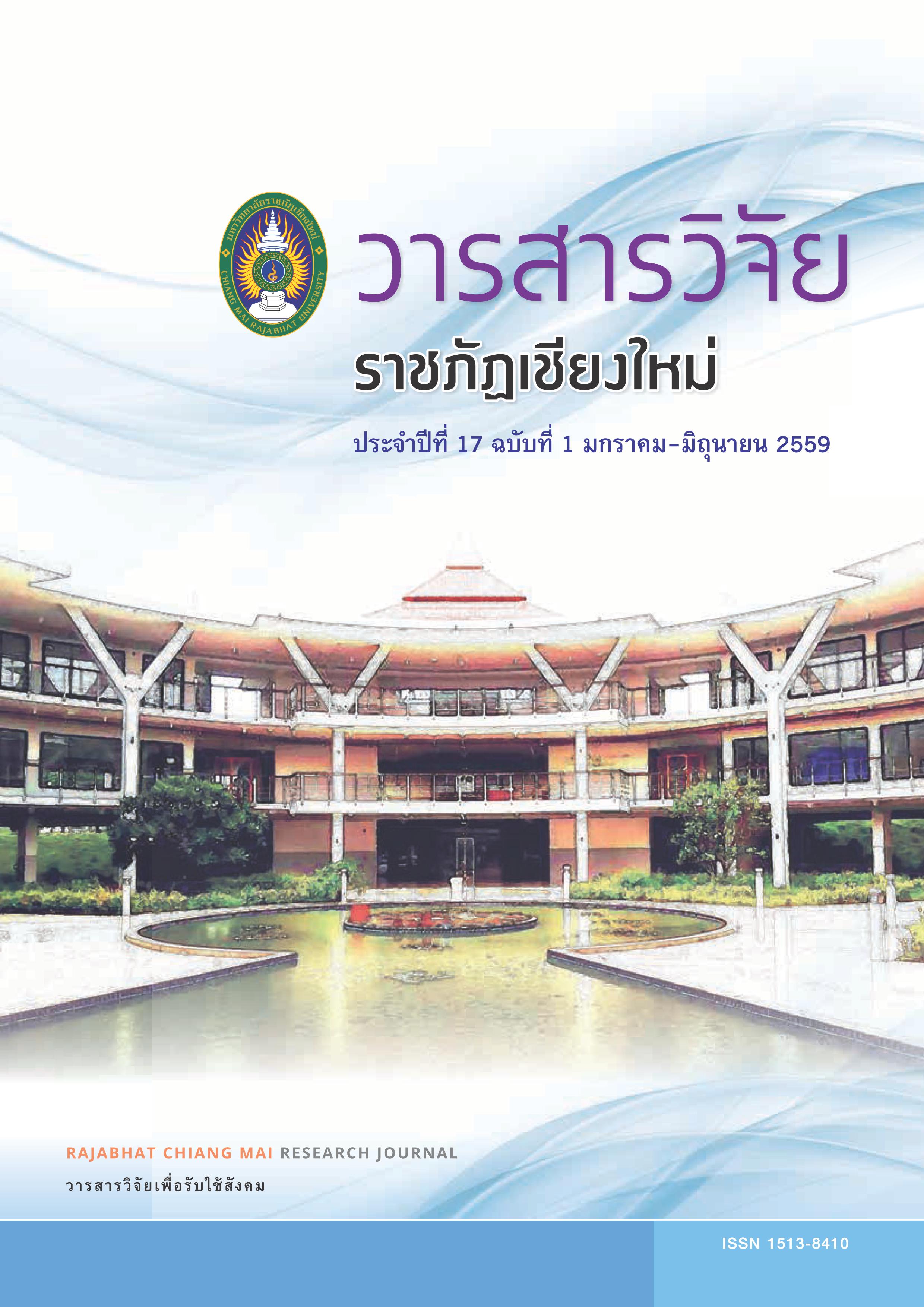Active Learning Management for Foreign Teachers toward Thai Students’ English Language Learning
DOI:
https://doi.org/10.14456/rcmrj.2016.214977Keywords:
Active Learning Management, Foreign Teachers, Thai Students Learning EnglishAbstract
This research aims to study the Active Learning quality of foreign English teachers. A handbook for teaching English in an Active Learning was developed as guidelines and to compare the results of Active Learning towards learning English for Grade 9 students in Chiang Mai and Lamphun. The populations in this research were 23 Private schools (Except the Foundation School) Grade 9 in Chiang Mai and 3 schools from Lamphun. After surveyed, there were 5 schools that willing to participate. Then classified the samples into two groups, 3 schools for experimental group and 2 schools for control group. A quasi-experimental design was used. Data was collected using a questionnaire, surveys, score points collected between semester, final scores, and the pre-test and post-test scores. The results showed that 1) The use of Active Learning for experimental school teachers increased. 2) An Active Learning Handbook for foreign teachers was appropriate. 3) The result of the experimental and control students’ English score, significant at 0.05, were as follow: (1) Before the experiment, the experiment and control students’ English score were not different. (2) For the experimental group, the English score after the experiment was higher than before the experiment. (3) The different score (post-pre) of the experimental group was higher than the control group.
Downloads
References
ศูนย์ข้อมูลความรู้ประชาคมเศรษฐกิจอาเซียน. 2558. 8 วิชาชีพ อ่อนภาษา-ไอที. (ระบบออนไลน์). แหล่งข้อมูล: http://www.thai-aec.com/728 (8 เมษายน 2558)
สำนักงานเลขาธิการสภาการศึกษา. 2552. ข้อเสนอการปฏิรูปการศึกษาในทศวรรษที่สอง (พ.ศ. 2552-2561). กรุงเทพฯ: พริกหวานกราฟฟิค.
มหาวิทยาลัยธรรมศาสตร์ คณะสถาปัตยกรรมศาสตร์และผังการเมือง หน่วยวิจัยเมือง. 2554. เชียงใหม่: บ้านหลังสุดท้ายของชาวต่างชาติ. (ระบบออนไลน์). แหล่งข้อมูล: http://www.cityresearchunit.org/th/files/chiangmai_creative_city/เชียงใหม่ บ้านหลังสุดท้ายของชาวต่างชาติ.pdf (22 กันยายน 2556)
องอาจ นัยพัฒน์. 2551. วิธีวิทยาการวิจัยเชิงปริมาณและเชิงคุณภาพ ทางพฤติกรรมศาสตร์และสังคมศาสตร์. พิมพ์ครั้งที่ 3. กรุงเทพฯ: สามลดา.
Alemu, B. M. 2010. Active Learning Approaches in Mathematics Education at Universities in Oromia, Ethiopia. Doctoral Thesis, University of South Africa.
Bonwell, C., & Eison, J. 1991. Active Learning: Creating Excitement in the Classroom (ASHE-ERIC Higher Education Report No.1). Washington, DC: George Washington. University. Jossey- Bass. (online). Retrieved from: http://www.ed.gov/databases/ERIC_Digests/ed340272.html (March 25th, 2013)
Dale, E. 1946. Audio-visual methods in teaching. New York: The Dryden Press.
Geressu, T. 2008. Perceptions and Practices of Active Learning in EFL Classes of Dilla University. Master Thesis, Addis Ababa University.
Howard, J. 2003. Academic Service-Learning: A Counternormative Pedagogy. In C. Compact (Ed.), Introduction to Service-Learning Toolkit: Reading and Resources for Faculty 2nd Edition. Rhode Island: Providence.
Laurin, R. K. 2009. Perceptions of Active Learning Techniques for Diversity Training in an Academic and Professional Settings: A Wisconsin Case Study. Master Thesis, The University of Wisconsin-Whitewater.
McKeachie, W. 2002. Teaching Tips: Strategies, Research, and Theory for College and University Professors. Boston, MA: Houghton Mifflin.
Meyer, C., & Jones, T. B. 1993. Promoting Active Learning: Strategies for the College Classroom. San Francisco: Jossey-Bass.
Mijena, A. E. 2015. The Practice of Active Learning Methods in English Language Classroom in Some Selected Secondary School of Jardega Jarte Woreda. Master Thesis, Haramaya University.
Robertson, D. R. 2005. Generative Paradox in Learner-Centred College Teaching. Innovation of Higher Education, 29(3): 181-194.
Standridge, M. 2002. Emerging Perspectives on Learning, Teaching, and Technology. (online). Retrieved from: http://projects.coe.uga.edu/epltt/ (September 8th, 2013)
Downloads
Published
How to Cite
Issue
Section
License
1. Articles, information, content, images, etc published in the “Community and Social Development Journal” are copyrighted by the Community and Social Development Journal, Chiang Mai Rajabhat University. In order to properly distribute the articles through print and electronic media, the authors still hold the copyright for the published articles under the Creative Commons Attribution (CC BY) license, which allows the re-distribution of the articles in other sources. References must be made to the articles in the journal. The authors are responsible for requesting permission to reproduce copyrighted content from other sources.
2. The content of the articles appearing in the journal is the direct responsibility of the article authors. The editorial board of the journal does not necessarily agree with or share any responsibility.














